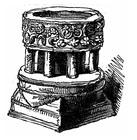
A Twitch Upon the Thread
VITAL WORKS RECONSIDERED, #16
Brideshead Revisited. By Evelyn Waugh.
“Is Evelyn Waugh a Catholic novelist?” a friend of mine asked. “I am thinking,” he explained, “of Brideshead Revisited. That book has a compelling quality; every few years it draws me back to it. But its mystery escapes me.”
In a way my friend is sensing the very mystery that draws the book’s narrator, Charles Ryder, to write about the family that lived at Brideshead. Charles, a non-Catholic, is both repulsed and attracted by the mysterious force that unites and directs the seemingly disparate members of the Flyte family. Part of the attraction of the book is that Waugh never explains the mystery; instead, he renders Charles Ryder’s experience of it.
Almost as soon as he becomes the chum of Sebastian Flyte, Charles makes us feel his repulsion for the Flyte family religion and for its chief representative, Sebastian’s mother, Lady Marchmain, whose attempts to bring stability to Sebastian’s life are viewed as the insidious cause of the decline she wishes to prevent. I have always suspected Waugh of laying a trap for the unsuspecting reader, in that he so deliberately makes us identify with Sebastian and Charles, those free spirits who find Oxford constraining, that we adopt Charles’s view of Lady Marchmain. Not until late in the novel do we realize that Waugh continually likens this remarkable lady to the Dolorosa (Our Lady of Sorrows).
The mystery that Waugh is rendering is best approached through a survey of the members of the Marchmain family. At one extreme stand three who remain staunchly Catholic. Lady Marchmain’s oldest son, Bridey, “massive” in his “rectitude,” embodies the “legalistic” side of the Church. Bridey knows all her regulations and never deviates from any. His strict adherence to Catholic precepts, especially at moments of crisis in the family (marriages, say, or deaths) causes spiritual explosions. Waugh uses “Bridey’s bombshells” to keep bringing reality into his sister Julia’s life and to precipitate the dramatic climax of the novel.
You May Also Enjoy
At its heart, The Power and the Glory is about the conflict between Caesar and God, with the lieutenant symbolizing the power and the lowly priest the glory.
Today's librarians apparently believe the only way to get kids to read is to sucker them in with books about television characters, or worse.
The opening struggle for a New Jerusalem is naturally beyond anyone’s ken. A novelist, perhaps alone among us, has the capacity to make compelling guesses.

